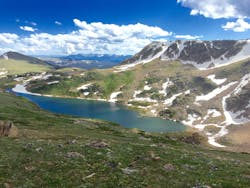University of Nevada, Reno, Receives $4.97 Million Grant
The University of Nevada, Reno, received a $4.97 million grant from the U.S. Department of Agriculture National Institute of Food and Agriculture to lead a major research effort. According to Farm Forum, this includes the Desert Research Institute, Colorado State University, Northern Arizona University and Arizona State University.
“Water is our most precious resource and finding solutions for dealing with water scarcity and quality is critical for communities across the U.S. who grow and raise the food we eat,” said Tom Shanower, acting NIFA director. “By investing in projects that address a critical problem for American agriculture, we aim to find better tools and technologies for water management practices that make a difference for our farmers, ranchers and foresters.”
Mountain snowpack is the primary source of water for the arid western U.S. The region receives precipitation in mountains far from agricultural fields and during the winter months when crops are not grown. Water allocation institutions are the rules, regulations, rights and management strategies that determine how that water gets distributed among competing uses. Changes in mountain snowpack are altering water availability in ways not yet well understood. It is not clear how well existing water allocation institutions will cope with the changes.
“Agriculture in the arid West has historically benefitted from natural storage and predictable melt rates of mountain snowpacks; but, existing built water storage and delivery infrastructure no longer represent our snowpacks,” said Adrian Harpold, assistant professor for the University of Nevada, Reno, College of Agriculture, Biotechnology and Natural Resources. “Earlier melting of mountain snowpack alters the timing of runoff, putting additional pressure on reservoirs to meet the needs of agricultural rights holder.”
The changes in availability and seasonal timing of mountain snowpack runoff mean that everyone, from farmers to municipal managers, are going to have to adapt. Conflicts have arisen where water allocation laws and regulations have failed to allocate water in accordance will all rights holders’ expectations, and water authorities have intervened to limit permitted water rights.
“This change in runoff timing will require more active management of reservoirs, based on new hydrometeorological forecasts rather than on historical climate norms, to enhance water supply for downstream consumption and to mitigate floods,” said Seshadri Rajagopal, assistant research professor for the Division of Hydrologic Science at the Desert Research Institute.
